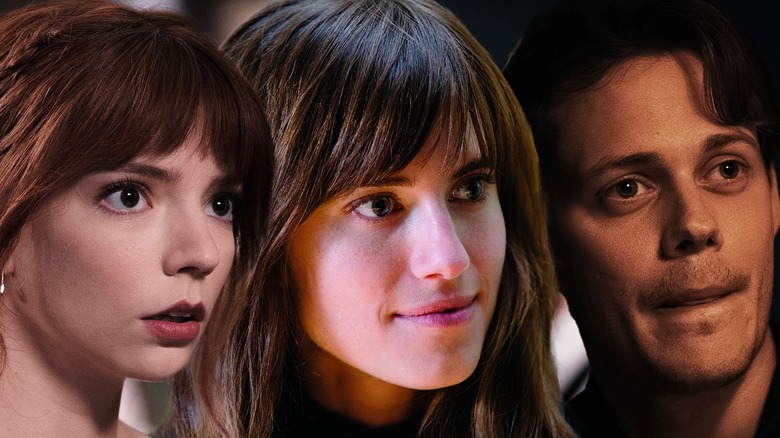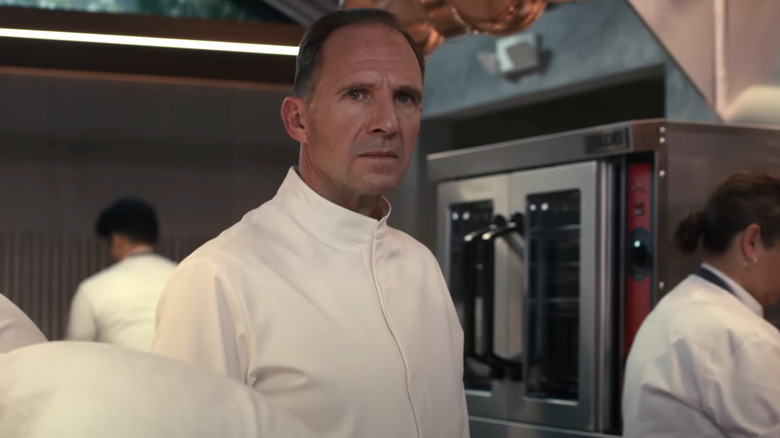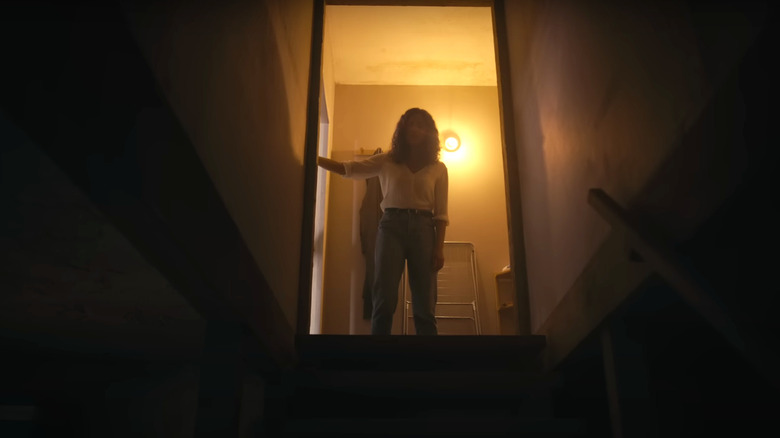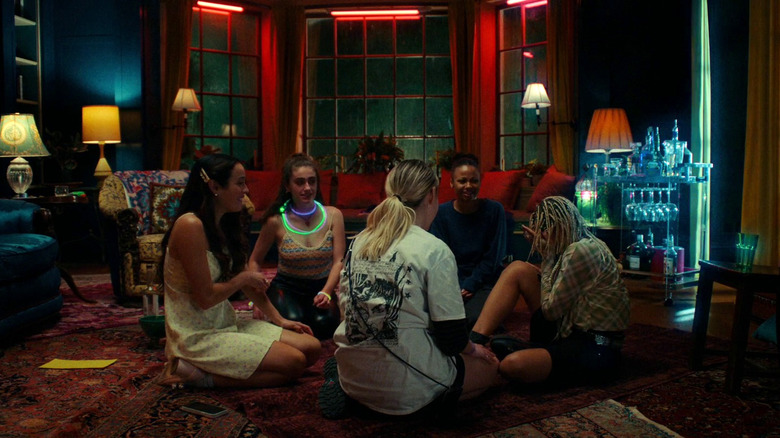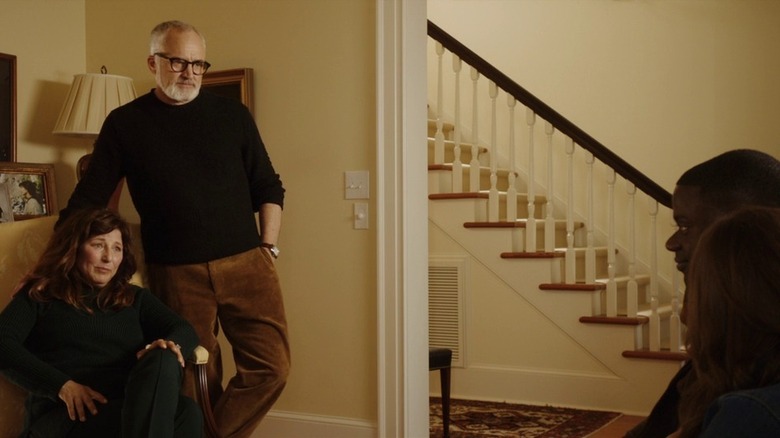From Barbarian To The Menu, Today's Horror Comedies Feed On The Rich, And Audiences Are Eating It Up
The horror comedy has always been a divisive subgenre. After all, what tones could be harder to meld together than laughing hysterically and cowering in fear? Even today, some of the best horror comedies have their naysayers. Which begs the question — what, exactly, makes a good horror comedy work? Well, one of the main ingredients seems to be ensuring that the target of the horrific violence is a person (or people) that viewers want to root against. Bonus points if the target is generally seen as a source of negativity in the world, or is representative of a group that people tend to be generally resentful toward.
Hence why, in today's polarized climate, the favorite punching bag of modern horror comedies has become the fabulously wealthy.
It's no surprise, really. Making fun of the rich and powerful is such an enjoyable pastime that wealthy folks themselves are known to partake in it. Key versions of this trend go as far back as medieval times, when the king or queen would employ a court jester whose sole job was to essentially make fun of the royal family and their friends. However, it is also telling that if the jokes were too good, the jester could find himself in the stocks — or worse, in the tightening embrace of the hangman's noose.
Still, with the increasing wealth divide in the United States, and the steady increase in living expenses for the working class, sympathies are at an all-time low for the top 1%. And when it comes to horror movies, as the box office proves, it's pretty much open season.
These horror comedies are an outgrowth of real-life disparities
As your average working-class consumer is cutting out items that they now consider to be luxuries from their grocery bill, the higher-ups who run these massive stores are announcing record highs in terms of profits (via The New York Times). It's just another example of the widening gap between the haves and the have-nots, but as the box office success of today's horror comedies makes it clear, one thing audiences do enjoy forking over hard-earned money for are dark films satirizing the wealthiest of the wealthy.
This isn't all about morbid resentment and the systemic flaws of capitalism, though, as many of the rich and powerful — from J.K. Rowling to Elon Musk to Kanye West — are actively destroying, belittling, or inciting acts of violence against the most marginalized groups in our society. And what do these pinnacles of modern civilization have to say for themselves during times of genuine crisis? Well, if that ridiculous video of a bunch of rich people singing a John Lennon song is any indication, not a lot.
Recent horror comedies have delighted in mocking the wealthy
There are a few notable examples from last year that show how great the desire has become to see these wealthy socialites taken down a peg, and it's telling that all three happen to be well-reviewed by both audiences and critics alike.
Let's start with writer-director Zach Cregger's crossover smash, "Barbarian." The film begins by introducing us to a couple of working-class folks who find themselves in an awkward situation when the AirBnb-style app that they used to secure their accommodations accidentally double-books them in the same house. As things get increasingly uneasy with some troubling discoveries about what this house has been used for in the past, the duo becomes fearful and unsettled, as any regular person would.
Now, juxtapose that with how the rich (and hilariously out-of-touch) celebrity who owns the home processes these discoveries. Instead of reacting like a reasonable individual might, he begins measuring the secret dungeon below his house in hopes of inflating its real estate value. This disconnected nature is part of what makes horror comedies that target the rich and famous so entertaining, because it's so easy to root against someone like AJ, who shows so little regard for anyone other than himself when he calmly shrugs off the obvious sex dungeon he discovers under his house.
In case the metaphors weren't quite clear enough, the film's finale paints it in bright colors, when he doesn't think twice about tossing a working-class woman to her death. This is the reason why audiences are likely to break out in cheers of joy when he finally gets his bloody comeuppance.
Horror comedies about the wealthy show disconnected overlords get connected with reality
"The Menu" pulls off this same trick as "Barbarian," as the audience feels nothing but revulsion for all of the guests at Ralph Fiennes's psychotic dinner theater, save Anya Taylor Joy's Margot. To be clear, "The Menu" isn't the simplistic "eat the rich" narrative people think it is, but it's definitely a pointed critique on the class divide, and it openly dialogues with the audience's need to delight in watching the aristocrats receive their just desserts. These guests include a scuzzy banker who squeezed people out of their properties throughout the COVID-19 pandemic, patrons so wealthy that they travel to an island for dinner on a regular basis, and a bevy of washed-up traders and celebrities.
"Bodies, Bodies, Bodies" pulls off an even more impressive feat, though, as the subjects of its ire are all rich 20-something Gen-Zers podcasters and influencers. In fact, the characters in this film are so vapid and full of themselves that, by the end of the film, it's clear that they literally created their own catastrophe, something that wealthy people are admittedly pretty adept at. As the self-absorbed partiers draw one dumb conclusion after another, and inevitably begin killing each other for no reason, the impetus of the bloody evening turns out to be nothing more than a TikTok video gone horribly wrong.
This horror comedy trend has grown alongside the widening wealth gap
Of course, this trend goes back further than 2022. It was a mere six years ago that Jordan Peele's directorial debut, "Get Out," debuted to rave reviews and an eventual Oscar nomination for best picture. Fans will recall that the movie has Daniel Kaluuya's Chris meeting the super-wealthy family of his girlfriend. What Chris gets for his trouble is the modern-day equivalent of a slave auction. However, this isn't before the supposedly forward-thinking liberals of the story get thoroughly mocked by the film itself — particularly the family patriarch, who immediately virtue signals to the Black protagonist by highlighting how much he loves Barack Obama.
Going back even further, Mary Harron's 2000 adaptation of Bret Easton Ellis' "American Psycho" makes both the killer and his victims the butt of the joke throughout. While Patrick Bateman (Christian Bale) monologues endlessly about his musical tastes before murdering the nearest set of ears, his friends and colleagues either don't know or don't care about his murderous predilections because they're too self-obsessed to notice, even after Bateman unleashes an unhinged confession to his lawyer in a manic late night phone call.
Brian Yuzna's 1989 horror comedy film "Society" takes this one step further by suggesting that the rich and powerful among us are a different species altogether, before showcasing them as they turn into their monstrous true form in order to feed on the poor directly. If that isn't an exact depiction of how working-class folks see the fabulously wealthy, it's hard to think of one that's more on the nose.
The reason for the popularity of these horror comedies is a massive power imbalance
Let's go back to the court jester, who entertained his medieval lords by mocking those very lords. It's pivotal to note how that trend pervades through to modern times, from late-night hosts skewering high society's elite in their opening monologues to celebrities voluntarily submitting themselves to vicious comedic roasts in hopes of garnering back a bit of goodwill from a public that has largely grown to despise them.
Is it any wonder, really, that this specific niche of horror comedies has become so popular?
Horror comedies offer dark humor, of course — but humor, nonetheless. And horror comedies allow viewers to take schadenfreude-flavored joy in the failures of their upper-crust tormentors, and just generally delight in their misery altogether. Likely, this is why horror comedies have pivoted so strongly to this narratives. Secretly — or not so secretly — we, as a society, delight in seeing terrible things happen to the people who are holding others down. We're always glad to see them taken down a peg, and the over-the-top allowances of horror, mixed with the equally exaggerated sensibilities of comedy, make for the perfect outlet.
